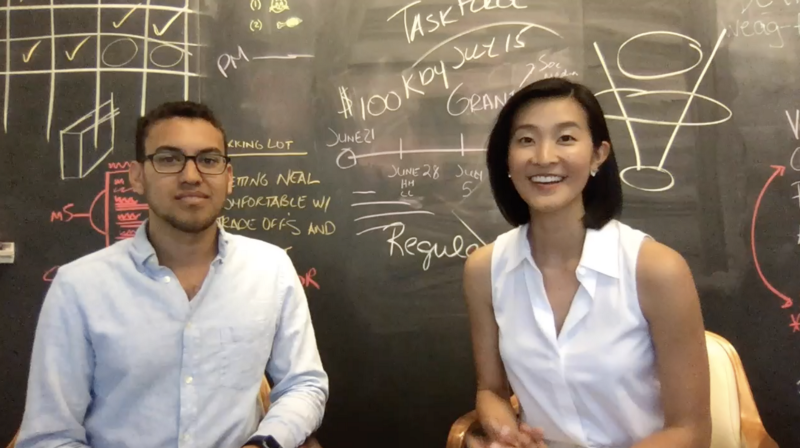As a Forbes 30 under 30 founder of a two-year-old snack company now sold in Whole Foods, Jordan shares the importance of vision.
Every few weeks as part of The Heartbeat, I asks one question to a founder, CEO, or business owner I respect about their biggest leadership lesson learned. This week, I interviewed Amir Salihefendić is the founder and CEO of Doist.
Jordan Buckner is the Founder and CEO of TeaSquares, a
Claire: Hi, everyone. I’m Claire Lew. I’m the CEO of Know Your Company, and today, I am thrilled to have with me, Jordan Buckner, who is the founder and CEO of possibly my favorite snack on the planet, no exaggeration, something called TeaSquares. I promise, by the way, Jordan has not paid me to say this. They’re truly my favorite snack — they’re really good. They’re exactly what they are called, tea snacks, and they’re going to found in Whole Foods, now Marianos.
Jordan is an entrepreneur based here in Chicago. He started his business just two years ago, and it’s already expanded nationally, as well as was on the Forbes 30 under 30, so just really thrilled to, yeah, have you here, Jordan.
Jordan: Thanks to be here as well. It’s always a ton of fun to find TeaSquares lovers. I will say once you actually have them, they’re kind of addicting, so you can’t stop, so I don’t blame you there.
Claire: True. Very, true. I’m here though not just to plug TeaSquares or just to talk about how delicious they are but to actually ask you, Jordan, this one question about leadership especially as a young founder who’s been doing this for two years. It’s a food business. It’s different. So, curious to know, in your opinion, what’s been one thing you wish you would have learned earlier as a leader?
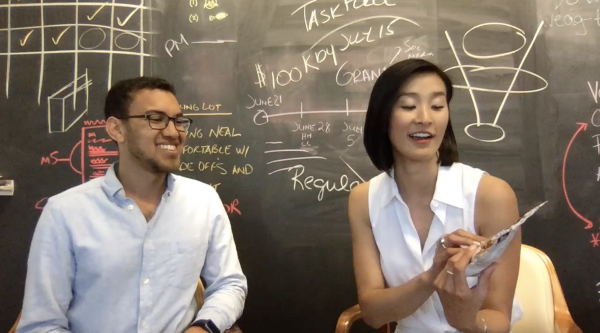
Jordan: I think it’s really tough for any entrepreneur to launch into a new product, new business without having any hard experience. I was actually new to the CPG, consumer product good space as a founder.
Claire: What were you doing before?
Jordan:I was actually working as a consultant in the food industry, so I knew a little bit about it, but I never ran a business myself. And so jumping in, I’m very much a idea person and could see all the pieces in the industry to think that a lot of people are snacking on to go and eating healthier snacks and looking for ways of getting a little bit of boost of energy. I kind of had that vision of a product that could satisfy all those needs, but actually building a team and building a product around it had a ton of difficulties in terms of taking your vision and executing that into reality with a large team as you grow.
The hardest thing that I wish I kind of knew was experience with working with others and bringing them along with your vision because it’s one thing to have it within your own mind. It’s difficult to bring others along with that vision as well when they have their own motivations along.
So that’s definitely been a big learning experience for me yes, but a lot of fun at the same time.
Claire: No, totally. I think it’s really interesting how you talked about, or self-identified very much with being an idea person. I think for a lot of founders and a lot of CEOs, when they first start out, they see themselves as that idea person, and then there comes a point where there needs to be a switch. You talked about how that switch from idea person to actual execution and motivating the team is challenging. Do you remember when that happened? Was there something at some point in the business, was there sort of a point of growth, or was it more gradual? Talk to me about like what was happening when you came to that realization.
Jordan: Sure. Two years ago when I started the company, I kind of knew early on that while I could launch into this on my own, that it would be really helpful to have a great team around me that could complement the skills that I didn’t necessarily have.
Claire: What are some examples, by the way, of like maybe, yeah, some of those skills?
Jordan: Definitely. I’m definitely more of the visionary. I can see the consumer problem and design solution to actually solve that problem in the market, but on some of the areas that are, say, not my expertise are just execution day-in, day-out. I like coming out with new ideas, and then once that happens, having other people that can help support executing those ideas is really valuable for me.
Claire: Yes, got it.
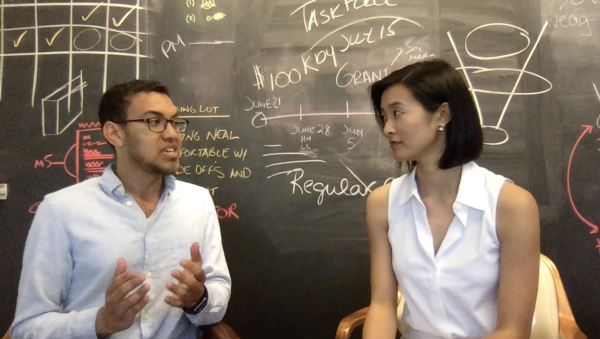
Jordan: When I was looking for team members and a couple of friends and colleagues who I actually always want to start a business with because we had similar values and similar ethics around creating products that really enhance the world around us while also doing a good for the world as well through their various social aspects, and so I actually found my team members first based on complementary skills. I brought along three other co-founders in starting the business that had skills across sales, operations, and design, and to help complement those skills.
Then, also, when we started the company, we want to really help young underserved individuals to provide learning opportunities for them. Part of our company mission is a social mission to help employ underserved neighborhoods, so we actually have a fellowship program, and hire young adults. We can teach them business, sales, and operations, so skills that they don’t necessarily have the opportunity to learn in school.
After taking the founders and pulling us all together around the common mission, then we have to go about building TeaSquares, building the company, and solving that problem in market. That was just a big learning opportunity for all of us, so running into challenges with manufacturing, with sales, with getting into our first retailer. For all of us without experience in the food industry, it was a huge learning opportunity, and we’ve just been continuously learning and growing ever since.
Claire: Absolutely. I love your approach around how you found those team members around values, right? I feel like values in the leadership space, to be frank, it’s such a fluffy word.
Jordan: Oh, it is. Yeah.
Claire: Yeah. I’ve written about values. I think you go to any conference or you meet any business article or book, and we talk about values but for you, Jordan, what do values actually mean, and then what are your values at TeaSquares? I have a lot of questions. I’m sorry. We’ll start with those two, and then I’ve got one more. How about that?
Jordan: Definitely.
Values, to me, mean how you conduct yourself and how you conduct your business– so the attributes and the method that you actually execute your vision to the world.
At TeaSquares, we have two visions, one being to create products that enhance people’s lives. For us, that means having a healthy snack that is filled with natural ingredients, not artificial ingredients, and then also having an energizing aspect that helps people fuel their passions in life through the organic tea. Then, on the other side, we have a social mission to fuel economic development and for us, it comes from a place of mentorship where all of us, as founders, want to give back to our communities and take all the knowledge that we’ve learned and help teach others as well. Those are the two biggest values that we have at TeaSquares.
Claire: I have so many thoughts around this. I’m just like, which question do I want to choose? The first sort of thread I want to pull on though is just how big of a deal the social mission is as part of your company. Keep in mind, everyone, this is a snack company, and you’re talking now about wanting to truly and deeply impact underserved communities and right here in Chicago. One of the things that, yeah, really compelled me to want to bring you here and to be on the Heartbeat is because you actually employ folks from the South Side of Chicago to help make the TeaSquares. I just think that it’s so incredible that that’s a value that you’ve chosen. That’s something that you’ve actually hired for.
I guess my next question is, how do you know if someone has that value? When you are hiring and choosing, not just founders but frontline employees, even choosing folks who are going to be part of your fellowship, how do you know if they sort of embody those two values?
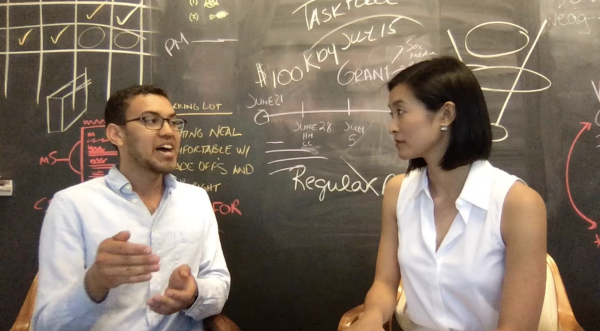
Jordan: At the very beginning, we’re bringing on new partners in the organization or new employees. We actually go through a pretty extensive interview process where we learn not only their skillsets and attributes but their motivations in life and what’s actually driving them to achieve the things that they are.
Some people are driven by higher morality values in terms of the effect they want to have on the world. Other people simply need to make money to support themselves to support their family. All those are completely legitimate, but in the people we’re bringing into TeaSquares, we want them to be invested in the product, invested in our mission of fueling people’s passions.
That really comes out and manifests itself in the way that they work within the organization, the way that they manufacture the product, and social kind of good that they put out into the world.
In addition to the interview process, we actually work with everyone on a limited basis to start to say, how do you fit within our organization? Is this the right fit for you and what you’re looking for in your life? Is this the right place for you to grow? If not, it’s very clear to say, “Hey, no worries. If you’re not kind of bought into our social mission, how we do business, that’s fine. It just isn’t the right place.” There’s other choices that might work, but for those who have a strong passion for wanting to change the world and create really high quality products, that’s the organization we’re trying to build.
Claire: Totally. It sounds like you do some sort of test trial to actually see what people are motivated by. I also really appreciate the fact that you’ve drilled into uncovering what someone’s motivation is in hiring because I think that’s also one of the most overlooked things when it does come to hiring. Personally, one of the best pieces of advice that I got around hiring and interviewing and trying to figure out what motivates someone is I had a mentor of mine who told me all the questions that that you want to ask, the truth is revealed if you ask about what they’ve done, not about what they’re going to do.
A lot of times in interview questions, I think we have a tendency to say, “Oh, what if you’re in this situation,” or, “What if you were given this amount of money?” hypotheticals. A lot of people can say lots of things when they’re hypotheticals, but when you ask about the past, what have you done? What someone’s track record been? That often reveals a lot going forward. Would you agree with that or what do you sort of think about when you’re actually in that interview process?
Jordan: Yeah. I would wholeheartedly agree because if people are truly motivated about something, they will find a way to make it work and turn that vision into reality, so if you ask about their track record and they’re motivated about some type of social mission or affecting change in the world, they’ll have examples of how they’ve done that during difficult situations.
That’s what we hire for: Not just what would you do in a perfect world, but what would you do in an imperfect world because that’s the reality we exist in.
Claire: Definitely. Jordan, I want to rewind back to before TeaSquares was in Whole Foods and in Marianos, and soon to be in Jewel, and this was just an idea. What were the biggest challenges that you ran into, and what advice would you have for any aspiring leaders who would face some more challenges?
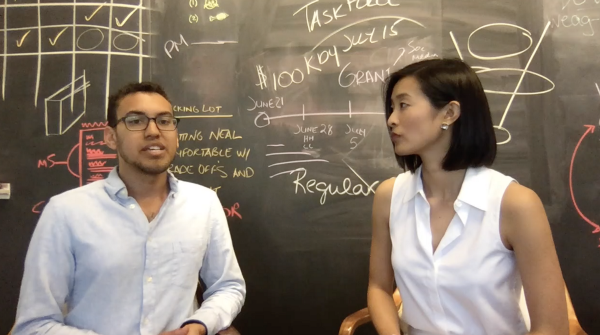
Jordan: In starting a new business, there’s always going to be tons of challenges along the way, and just like in every industry within food and without, being an entrepreneur is a roller coaster. There’s constantly going to be highs and lows and learning opportunities throughout. The biggest thing that I would say with that is, understand that you’re on a journey and really enjoy that journey along the entire path of running your business, and then also be open to working with mentors and others who know a lot more than you do. In starting with this new space in the snack industry, there’s a whole lot of people that knew a whole lot more than I did.
I actually sought out mentors and sought out experts and advisors who were experts in manufacturing and marketing and sales, and so for instance, joining a program here The Good Food Business Accelerator that’s partnered with Whole Foods and a large number of food industry companies to actually learn specifics around running a food business, doing finance within the food industry, sales and marketing for food specific industry components, and that wasn’t extremely helpful. Not only that, but it allowed access to a larger cohort of other entrepreneurs who are doing something similar. I now partner with about a dozen or two dozen companies that work together to foster what’s called the good food movement, so good food that is healthy and impactful on the body and also the community. As entrepreneurs, we share resources together to help further the growth of all of our businesses.
Claire: Totally. I want to go back to that first sort of piece of advice that you gave, which is to enjoy the journey. Did you not enjoy the journey or tell me why that, to you, that’s something you want to be sharing with, with our viewers here?
Jordan: Definitely. A lot of first-time entrepreneurs or if you’re thinking about starting a business, you’ll think about what the end result is, so I want to have a nationwide company that’s selling to millions of people or I want to be a millionaire.
The path to get there is never a straight line. We’re used to seeing hockey stick projections in every investor presentation that say, “I’m going to start with one customer today, and a million customers tomorrow,” without having a clear path to get there. The journey is often along a timeline that you don’t get to control in terms of when new customers come and use your product, and figuring out any pivots that you have to make and tweaking your value proposition.
If you’re only focused on the hypothetical end destination, it’s tough to navigate all the ups and downs along the journey for the entire way.
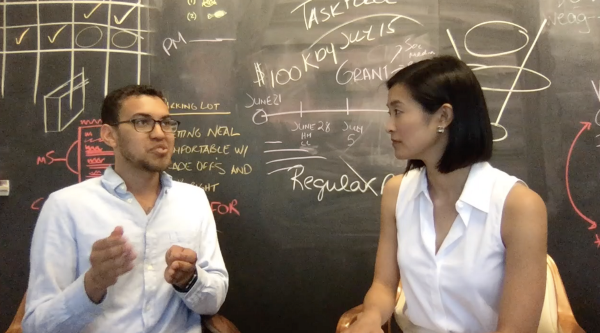
The other thing is that there is no kind of green pastures in the distance that one day, you’ll just make it to and everything will be perfect. No matter what scale your business is in, there’s always going to be larger and larger problems to solve, and so the best entrepreneurs enjoy solving problems, and then moving on to larger and bigger problems. That’s the only way to really kind of enjoy the entire journey and process, and manage the low points.
Claire: Absolutely. I think it’s such a fascinating duality to hear as a, I mean just as a fellow CEO who feels like your tunnel vision, in some ways, is your best asset, right? It’s what is going to let you see a path to something that other people don’t see. Yet at the same time, to what you explained, when you are so locked in, you can’t adapt and change the things that you’re not necessarily always paying attention to. To the, just pure … Like you’re saying, there’s so much outside of your control. I just think that the process of leading a business, starting a business is, it’s like trying to hold and juggle two different parts of one and this duality of, you know what, you have to be super focused but you can’t be too focused, and you want to be enjoying every part of it.
Jordan: Exactly. Now, have you found times where it’s beneficial to have a tunnel vision, and other times where it’s beneficial to step back from that?
Claire: Absolutely. Well, what’s interesting is I think, as a leader, you have to be a little bit delusional to see things that other people don’t see. There’s a reason why current solutions don’t exist in the world. It’s because people don’t believe that they can happen, so you have to be crazy enough in some ways to think that it’s true.
When I first took over the CEO of Know Your Company and before that, as a consultant helping CEOs create a better work environment for their employees, a lot of people just didn’t think it was that possible to create a work environment where employees can be heard. I had the sort of tunnel-vision enough and crazy enough about this problem that I thought a solution could exist, and that you could do technology in a way that was friendly and not for “Big Brother-ish”. That it could be really, really easy.
That was to my advantage there, but that tunnel-vision and the delusion, if I held on too tightly to it, then I wouldn’t understand how the market’s changing, what my customers actually want, how competitors are also sort of also plying the space. When, as a CEO, as a leader, if you’re not able to see that reality for what it is, it’ll come up and surprise you.
Jordan: That is so true. Two things you mentioned as well, which was having and identifying a problem. That was a really big important problem that already existed, and then having a strong vision on how that solution could be better and how the world could be better.
What I’ve been experimenting with and really understanding and learning is that it’s good to have a tunnel vision to that vision of what the future will look like, but then natural ways and means of getting there and having some flexibility and adaptability to change along the way.
Claire: Absolutely, so clarity on that, and vision, but not an obsession that it has to exactly be that, nor should the path have to go a certain way to get there right. I love that. Well, Jordan, thank you so much for sharing your insights around vision, around hiring, and just around how to start a company, especially a successful snack foods business. It’s been awesome to have you on.
Jordan: Definitely. Thank you so much.
Claire: Cool.
